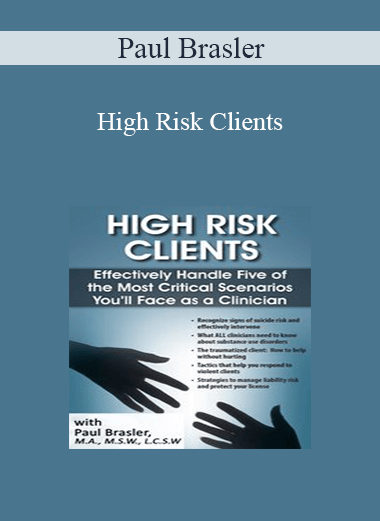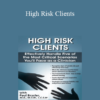$219.99 Original price was: $219.99.$41.00Current price is: $41.00.
[Instant Download] – Immediately deliver the download link after receiving the payment
 Purchase this course you will earn 41 Points worth of $4.10
Purchase this course you will earn 41 Points worth of $4.10Elevate your skills with the Paul Brasler – High Risk Clients: Effectively Handle Five of the Most Critical Scenarios You’ll Face as a Clinician course, available for just $219.99 Original price was: $219.99.$41.00Current price is: $41.00. on Utralist.com! Browse our curated selection of over 60,000 downloadable digital courses across diverse Uncategorized. Benefit from expert-led, self-paced instruction and save over 80%. Start learning smarter today!
[Instant Download] – Immediately deliver the download link after receiving the payment
Purchase Paul Brasler – High Risk Clients: Effectively Handle Five of the Most Critical Scenarios You’ll Face as a Clinician courses at here with PRICE $219.99 $41
- Faculty:
- Paul Brasler
- Duration:
- 6 Hours 14 Minutes
- Format:
- Audio and Video
- Copyright:
- Apr 18, 2018
Description
| Manual (4.8 MB) | 79 Pages | Available after Purchase |
Outline
- Client Assessment: Ask the Right Questions
- Conduct comprehensive assessments
- Mini mental status exam
- Lethality assessment: Suicide and homicide
- Substance use assessment
- Trauma assessment
- Tips and strategies for eliciting the right information
- Conduct comprehensive assessments
- The Suicidal Client: More than 13 Reasons Why
- High-risk populations—who is most at risk?
- Implicit and explicit expressions of suicidal ideation and intent
- Self-injurious behavior and suicidal ideation
- Suicide assessment and interviews: Ideation, plans, means, intent
- What do I do now? —Disposition & safety planning
- Why “No-Harm Contracts” are harmful
- Breaking client confidentiality
- When in doubt, do what?
- Hospitalization process
- After the ER: When clients are not admitted
- Case studies:
- Michelle—Teenagers experiencing suicidal ideation
- William—The intersection of substance use, mental illness and suicidality
- The Violent Client: Manage Dangerous Situations
- Dealing with our fears: Clinicians’ safety concerns
- When the clinician is the target
- When others are the target
- De-escalation techniques
- Preventative planning
- Office layout
- Keeping good boundaries
- Police involvement before a crisis
- Safety planning
- When to call 911
- Hospitalization process
- Duty to warn
- Case studies:
- George—Handle a violent client
- Dale—Practice Duty to Warn
- The Addicted Client: What ALL Clinicians Need to Know
- How misdiagnosis harms clients
- Signs of intoxication
- Imminent risk: Signs and symptoms of overdose
- Identify withdrawal syndromes
- Accurate diagnosis and treatment matching
- Drug basics that clinicians should know:
- Opioids and the opioid crisis (heroin, fentanyl and emerging drugs)
- Stimulants (cocaine, “bath salts,” methamphetamine)
- Cannabinoids (“shatter,” spice)
- Other chemicals (DXM, “Special K,” Ayahuasca)
- When and how to refer to a higher level of care
- Case studies:
- Percy—Opioid crisis in the waiting room
- Cathy—Bipolar Disorder? Think again
- The Traumatized Client: Help Without Hurting
- Recognize trauma in clients
- The risk of misdiagnosis
- Dangers of improper treatment
- Strategies for trauma-informed care
- First and foremost: Safety inside and outside the clinic
- The role of mindfulness
- Go slow…but go
- Understand Levels of Safety
- Triune Brain Model and trauma
- Bereavement: Not always trauma
- The intersection of trauma, mental health, substance abuse and medical problems
- Case studies:
- Brian—Trauma missed
- Mick—“How deep can I bury this?”
- Medical vs. Psychiatric Problems: Limiting Harm
- “What Could Kill the Patient First?”
- Collaborative care with primary physician
- Medical emergencies that present with psychological symptoms
- Signs and symptoms: Limit client harm by recognizing a medical emergency
- Medication-Related Disorders
- Traumatic Brain Injury (TBI)
- Neurocognitive Disorders
- Other Neurological Illnesses
- Case studies:
- Steven and the Zombies—Organic disorders
- “Granny has schizophrenia!”
- High Risk Clinicians: After the Crisis
- Protect your license and manage liability
- Documentation: What you need to know
- Debriefing and supervision
- Vicarious trauma
- Addressing compassion fatigue
- Case study:
- Dave and me
-
Limitations and Potential Risks
- Limited controlled studies
- Seek supervision when necessary
- Weigh out risk of intervening versus not intervening
Faculty

Paul Brasler, MA, LCSW Related seminars and products: 10
Paul Brasler, MA, LCSW, has worked in the social work field for the past 22 years. He is the head of behavioral health for Daily Planet Health Services, a Federally Qualified Health Center that provides comprehensive and integrated healthcare and mental health services (including medication-assisted opioid treatment). Paul is also president of Providence Consulting & Education L.L.C., through which he provides clinical supervision and professional education services.
Paul has extensive experience in working with people with substance use disorders. After finishing school, Paul went to work at an adolescent residential treatment program, where he developed a treatment track for adolescents with substance use disorders. In 2003, he became a senior clinician in the Chesterfield County Juvenile Drug Court and provided individual, family, adolescent group and multifamily group therapies. After working at the drug court for seven years, Paul moved on to conduct psychiatric and substance misuse evaluations in emergency departments in the Greater Richmond, Virginia area. Paul has also served as adjunct faculty in the school of social work at Virginia Commonwealth University, where he developed a graduate course in substance abuse treatment.
Paul has been a PESI presenter since 2016, and he has presented classes on mental health emergencies and high-risk clients across the country. He recently released his first book, High-Risk Clients: Evidence-Based Assessment & Clinical Tools to Recognize and Effectively Respond to Mental Health Crises (PESI Publishing 2019).
Speaker Disclosures:
Financial: Paul Brasler is in private practice. He receives a speaking honorarium from PESI, Inc.
Non-financial: Paul Brasler has no relevant non-financial relationship to disclose.
Purchase Paul Brasler – High Risk Clients: Effectively Handle Five of the Most Critical Scenarios You’ll Face as a Clinician courses at here with PRICE $219.99 $41
Cultivate continuous growth with the Paul Brasler – High Risk Clients: Effectively Handle Five of the Most Critical Scenarios You’ll Face as a Clinician course at Utralist.com! Unlock lifetime access to premium digital content, meticulously designed for both career advancement and personal enrichment.
- Lifetime Access: Enjoy limitless access to your purchased courses.
- Exceptional Value: Benefit from savings up to 80% on high-quality courses.
- Secure Transactions: Your payments are always safe and protected.
- Practical Application: Gain real-world skills applicable to your goals.
- Instant Accessibility: Begin your learning journey immediately after buying.
- Device Compatible: Access your courses seamlessly on any device.
Transform your potential with Utralist.com!
Related products
Uncategorized
= 35 Points
Uncategorized
Legal Risks in Nursing Documentation – Use Extreme Caution When Skimming the Facts – Rosale Lobo
= 40 Points
Uncategorized
Managing Geriatric Behaviors: Wandering, Aggression, Malnutrition and More – Steven Atkinson
= 35 Points
= 85 Points
Uncategorized
Disordered Eating Behaviors: Identify and Treat the Underlying Trauma – Lori Kucharski
= 85 Points
= 125 Points
Uncategorized
Optimizing Compliance and Maximizing Revenue for Ophthalmology and Optometry – Jeffrey P. Restuccio
= 85 Points
Uncategorized
= 85 Points


![[Audio] IC11 Workshop 47 - Advanced Techniques of Hypnosis and Therapy - Jeffrey Zeig](https://utralist.com/wp-content/uploads/2023/04/Audio-Only-IC11-Workshop-47-Advanced-Techniques-of-Hypnosis-and-Therapy-Jeffrey-Zeig-100x100.png)


